Official Development Assistance (ODA)
Gender Equity and Women’s Empowerment
Japan's Action
- International Trends Regarding the Sector
- Japan's Action
- Statistics
- References
- Links
- FAQs
The Government of Japan will utilize the "power of women" as the greatest potential for growth in Japan and strengthen cooperation with the international community and assistance for developing countries, based on its firm belief that creating "a society where women shine" will bring tremendous energy to the world.
Domestic Action
Japan has supported a series of international pledges aimed at achieving gender equality and women's empowerment. Examples include the World Action Plan adopted at the First World Conference on Women (1975), the Convention on the Elimination of All Forms of Discrimination against Women (1979; Japan signed it in 1985), and the Beijing Declaration and Platform for Action (1995). Domestically, the country brought the Basic Act for Gender Equality Society into force in 1999, and stipulated in the act that the nation "shall endeavor to take necessary measures ... for the smooth promotion of international mutual cooperation related to the Formation of Gender Equal Society." In addition, the Basic Plan for Gender Equality (formulated in 2000) stipulated the promotion of the WID (Women in Development) Initiative.
With regard to ODA, the "gender equality perspective" was incorporated into the Basic Policies of the ODA Charter, and the "perspective of gender" was stipulated in the Medium-Term Policy on ODA. Based on these policies, Japan formulated the "WID Initiative" in 1995 as a Sectoral Development Policy, and has provided assistance through ODA in three priority areas: women's education, health, and participation in economic and social activities. Furthermore, in 2005, ten years after the Fourth World Conference on Women, the situation surrounding women in developing countries had changed, and awareness of the importance of gender mainstreaming in the development process had increased. Accordingly, Japan formulated and announced the "Initiative on Gender and Development (GAD)" in March 2005, emphasizing the importance of incorporating the gender perspective into every phase of ODA.
The "Development Cooperation Charter" that was decided on in February 2015 also states: "In the context of gender equality and greater role of women in development, Japan will encourage the participation of women at every phase of development cooperation and be more proactive in ensuring that women share equitably in the fruits of development, while giving consideration to the possible vulnerabilities of women and their special needs." The Charter's Sectoral Development Policy, the "Development Strategy for Gender Equality and Women’s Empowerment," also includes the promotion of a gender-responsive infrastructure, support for girls' education (including STEM [Science, Technology, Engineering and Math]), and women’s leadership in disaster risk reduction and other sectors as its priority areas. Through these, Japan is aiming to help women play active roles and achieve high-quality growth.
MOFA's Action
The Ministry of Foreign Affairs of Japan (MOFA) has been working to reinforce the support for gender mainstreaming in ODA projects toward developing capacity within the organization and giving more consideration to gender. Specifically, in order to strengthen the gender equality perspective in ODA policies, MOFA also took the perspective of gender into account in the "Basic Design for Peace and Health " and "Learning Strategy for Peace and Growth," which were announced in conjunction with the UN Summit on the adoption of the "2030 Agenda for Sustainable Development" in September 2015. In addition, in order to steadily promote gender issues, each employee, including executive officers, must recognize the importance of gender equality and address it in an organizational manner. To this end, MOFA is promoting gender mainstreaming by mobilizing the ODA officers in charge of gender issues stationed at diplomatic missions abroad to gather lessons, etc. from examples of good practice where due consideration was given to the gender perspective and of bad practice where it was not, and share the information.
In his address to the UN General Assembly in September 2013, Prime Minister Abe raised the subject of women-related measures emphatically, and announced that Japan would provide assistance in excess of US$3 billion over the next three years from 2013 to 2015 (bilateral ODA and assistance through international organizations), targeting three key areas: (1) promoting women's participation in society and the empowerment of women, (2) strengthening efforts in the sector of health and medical care for women, and (3) women's participation and protection in the sector of peace and security. Following this, Japan went to steadily implement the plan.
During the G7 Ise-Shima Summit in May 2016, Japan announced that in the three years from 2016 to 2018, it would improve the learning environment for approximately 50,000 girls through initiatives such as constructing schools—especially in regions where the spread of education for girls was lagging behind (Africa and South Asia)—and develop human resources, including approximately 5,000 female administrators in the sectors of maternal and child health, disaster risk reduction, peacebuilding (police and measures against human trafficking), and entrepreneurship. It went on to steadily implement the announced contributions. In addition, at the Third World Assembly for Women: WAW! in December 2016, under the "Development Strategy for Gender Equality and Women's Empowerment," Japan announced that it would provide total assistance in excess of US$3 billion over the three years from 2016 to 2018, targeting as priority areas (1) promoting women’s and girls' rights, (2) improving an enabling environment for women and girls to reach their full potentials, and (3) advancing women’s leadership in politics, economy and other public fields. It went on to steadily implement the commitment.
In the opening address for the Fifth WAW!/W20 in 2019, Prime Minister Abe announced that Japan would provide quality education and human resource development opportunities to at least four million women in developing countries over the three years from 2018 to 2020. Furthermore, the decision was made to raise the issue of girls' education in developing countries at the G20 Osaka Summit chaired by Japan, and Prime Minister Abe himself actually held a special summit event on the empowerment of women with a focus on (1) women's participation in labor, (2) support for girls' education, and (3) support for women entrepreneurs, etc.
- Results of US$3 Billion of Assistance for Women's Advancement (2016)(PDF)

- Japan's Initiatives toward G7 Ise-Shima Summit)(PDF)

- Expanded SDGs Action Plan 2019 (PDF)

- SDGs Action Plan 2020 (PDF)

- SDGs Implementation Guiding Principles Revised Edition (December 2019) Japanese (PDF)
 /Summary (PDF)
/Summary (PDF)
- Pages Related to World Assembly for Women: WAW!
Policy Direction and Commitments in the Gender Sector
Development Cooperation Charter (February 2015) (Excerpts)
- I. Philosophy
- (2) Basic Policies
-
B. Promoting human security
... from the standpoint of its people-centered approach, Japan will also proactively contribute to promoting basic human rights, including women's rights.
-
B. Promoting human security
- (2) Basic Policies
- III. Implementation
- (1) Implementation principles
- B. Principles for securing the appropriateness of development cooperation
-
(f) Promoting women’s participation
In the context of gender equality and greater role of women in development, Japan will encourage the participation of women at every phase of development cooperation and be more proactive in ensuring that women share equitably in the fruits of development, while giving consideration to the possible vulnerabilities of women and their special needs.
-
(f) Promoting women’s participation
- B. Principles for securing the appropriateness of development cooperation
- (1) Implementation principles
Development Strategy for Gender Equality and Women’s Empowerment (May 2016)
- Full Text (Japanese [PDF]
 / English [PDF]
/ English [PDF] )
) - Summary (Japanese [PDF]
 / English [PDF]
/ English [PDF] )
)
Japan’s Initiatives toward G7 Ise-Shima Summit (May 2016)
- Summary (Japanese [PDF]
 / English [PDF]
/ English [PDF] )
)
Examples from the Gender Sector
Priority Area 1. Respect for the rights of women and girls and improvement of their vulnerable situation
Women-friendly infrastructure
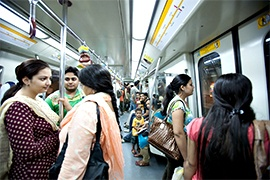 (Photo: JICA)
(Photo: JICA)
Delhi Mass Rapid Transport System Project (India)
In South Asian countries such as India and Bangladesh, harassment and sexual attacks on women in public spaces are recognized as serious problems. A lack of access to safe and comfortable public transportation limits women’s options for schooling and working, and constrains their advancement in society. This project aims to create the “world’s most user-friendly subway” including the adoption of station buildings and facilities and train cars that are considerate to female, elderly and disabled users (such as elevators, escalators and security cameras in stations, and women-only cars and the installation of emergency notification equipment in all cars of trains). Sign language training for station and onboard staff is also being provided. Similar women-friendly urban transport projects are also underway in Bangladesh's capital Dhaka, and Sri Lanka's largest city Colombo.
Improving the learning environment for girls
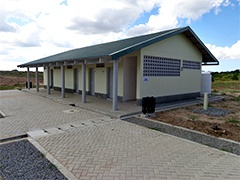 (Photo: JICA)
(Photo: JICA)
Project for the Construction of Secondary Schools in Nampula Province (Mozambique)
In Mozambique, an increasing number of students are seeking to advance to secondary education after completing primary education, but due to a lack of classrooms many students are unable to enter a secondary school, so the construction of school facilities is an urgent issue for the country. In this project, Japan provided assistance for the provision of the necessary equipment and materials and for the construction of secondary school classrooms, toilets and sanitation facilities in northern Nampula Province, where the secondary school enrolment rate is low. Constructing safe, secure and sanitary toilet facilities will make it possible for more female students to enroll in secondary education and it is hoped that this will improve the enrolment rate.
Pregnant women and newborn's health
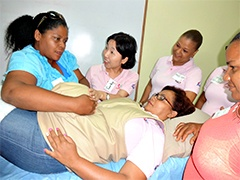 (Photo: JICA)
(Photo: JICA)
Project for Strengthening Primary Health Care for Pregnant Women and Newborns in Health Region III (Dominican Republic)
The Dominican Republic's indicators for pregnant women and newborn's health are worse than the averages for Latin America and the Caribbean. In the Dominican Republic, maternity care is provided at hospitals and prenatal and postnatal checkups and neonatal care are provided by the Community Health Units (UNAPs)—primary medical facilities. However, the levels of service are not uniform, and there is a lack of smooth cooperation between facilities. In this project, Japan provided assistance toward strengthening the capacity of UNAP personnel and developing a referral system to connect UNAPs and hospitals, with the aim of improving the quality of prenatal, postnatal, and neonatal care provided by UNAPs in Health Region III. It is hoped that this will help reduce the mortality rates among pregnant women and infants in Health Region III.
Priority Area 2: Establishing a Foundation for Women to Fully Demonstrate Their Abilities
Training of female police officers
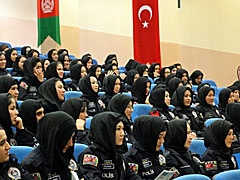 (Photo: JICA)
(Photo: JICA)
Assistance for Female Police Officers in Afghanistan (Afghanistan)
In Afghanistan, gender-based violence, including domestic violence, sexual violence, child marriages and honor killings, present urgent threats to the safety and human rights of women in the country. The Government of Japan has provided assistance for police officers in Afghanistan through contributions to the Law and Order Trust Fund for Afghanistan (LOFTA), which is managed by the United Nations Development Programme (UNDP). In addition, since FY2014 JICA has dispatched individual experts to provide training to female Afghan police officers in Turkey, through programs run by UNDP/LOFTA. In the training implemented in FY2019, 250 newly recruited female police officers participated, bringing the cumulative total since 2014 to about 1,500. At the same time, in FY2017 and FY2019, "Training for Afghan Policewomen to Address Gender-based Violence" (an individual technical cooperation project) aimed at middle-ranking female police officers was implemented in Japan to further strengthen their capacity.
Development of female academic staff in engineering
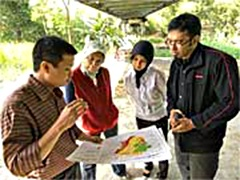 (Photo: JICA)
(Photo: JICA)
ASEAN University Network / Southeast Asia Engineering Education Development Network (AUN/SEED-Net) Project (ASEAN)
Industrial structures and corporate activities are becoming increasingly advanced in ASEAN countries. However, higher-education institutions are falling short in terms of research activities and developing a global standard of human resources for advanced industry in engineering fields, with regard to ability to address various challenges such as industry diversification and environmental issues. In this project, Japan is providing assistance toward developing engineering academic staff, including female staff, and establishing systems for advanced research and education, through cooperation between AUN/SEED-Net member universities and Japanese supporting universities.
Priority Area 3: Improving Women's Participation and Leadership in the Political, Economic, and Public Sectors
Improving women's leadership in the disaster risk reduction sector
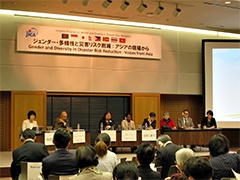 (Photo: JICA)
(Photo: JICA)
"Gender and Diversity in Disaster Risk Reduction" Japanese Invitation Project (Asia)
What impact disasters have on people varies depending on factors such as their gender, age, and whether they have any disabilities. Therefore, when formulating and implementing disaster risk reduction policies and plans, gender and diversity perspectives are important at all stages of prevention, emergency response, and reconstruction. To that end, it is essential to ensure that women and a diverse range of other people have the opportunity to participate in activities and decision making. In this project, Japan invited government officials and representatives of civic organizations from seven Asian countries, and provided training to help them include gender and diversity perspectives in their disaster risk reduction and disaster prevention efforts.
Support for female entrepreneurs
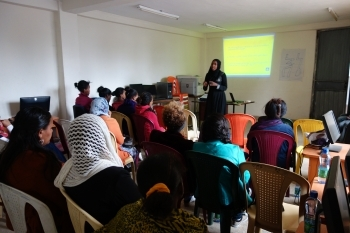 (Photo: JICA)
(Photo: JICA)
Women Entrepreneurship Development Project (Ethiopia)
The government of Ethiopia has set a goal of escaping from poverty by 2025 by shifting from an economy based on agriculture and developing its industry further. It has also announced that it will support the growth of small businesses, which have been increasing in the country in recent years. However, Ethiopia's financial institutions are chronically underfunded and reluctant to provide loans to small companies, which are regarded as representing a high risk and requiring high administrative costs. Moreover, in Ethiopia, the homes and land necessary to secure loans tend to be registered under men's names, which makes it particularly difficult for female entrepreneurs to obtain financing opportunities. This project co-finances female entrepreneurs together with institutions such as the World Bank. It provides access to funds and training opportunities for businesses in major cities that are managed or jointly managed by female entrepreneurs, with the goal of contributing to increased profits for the businesses and to employment, and in turn, helping to improve women's social status and supporting business growth and the development of the private sector in general.

